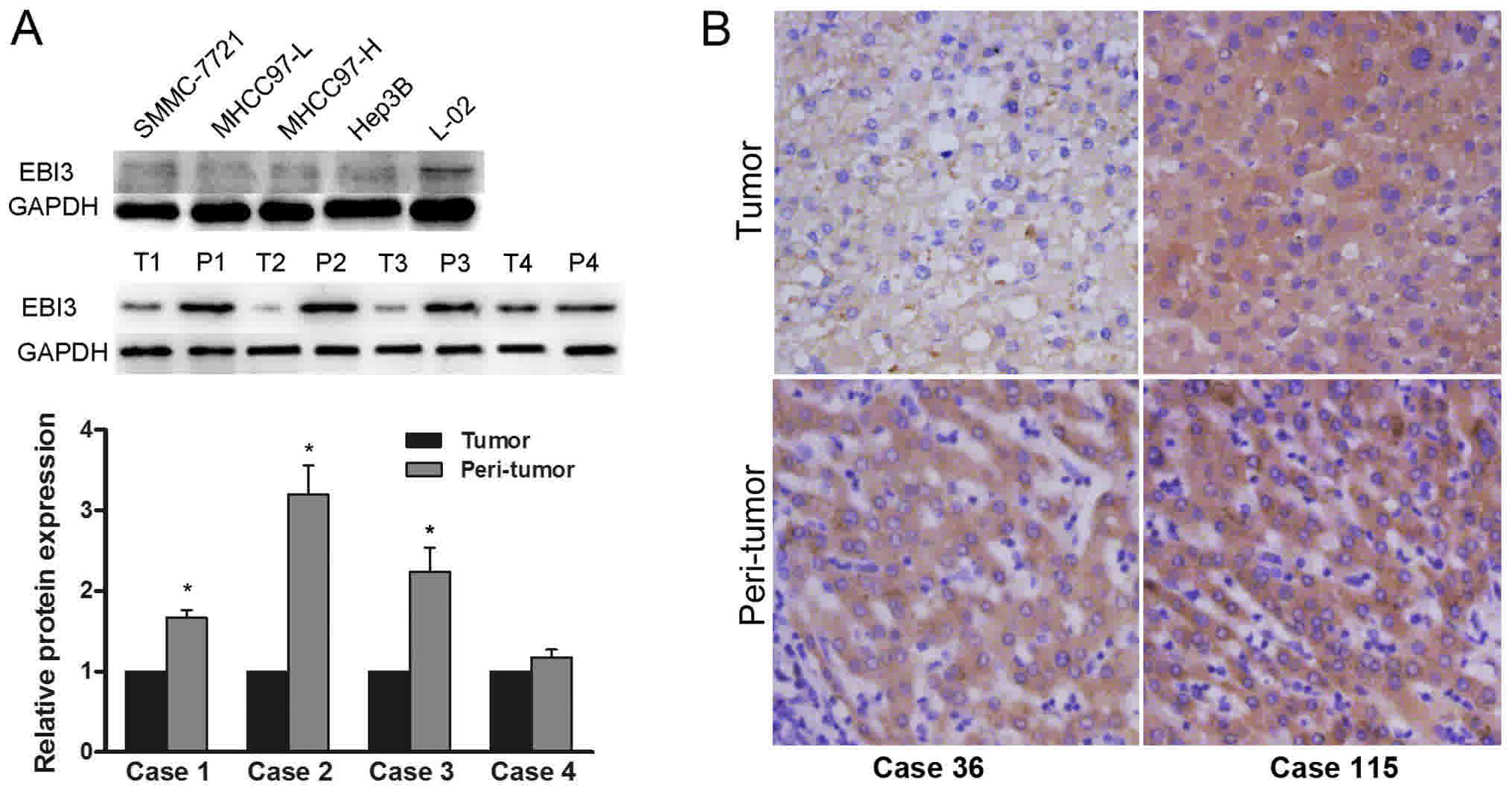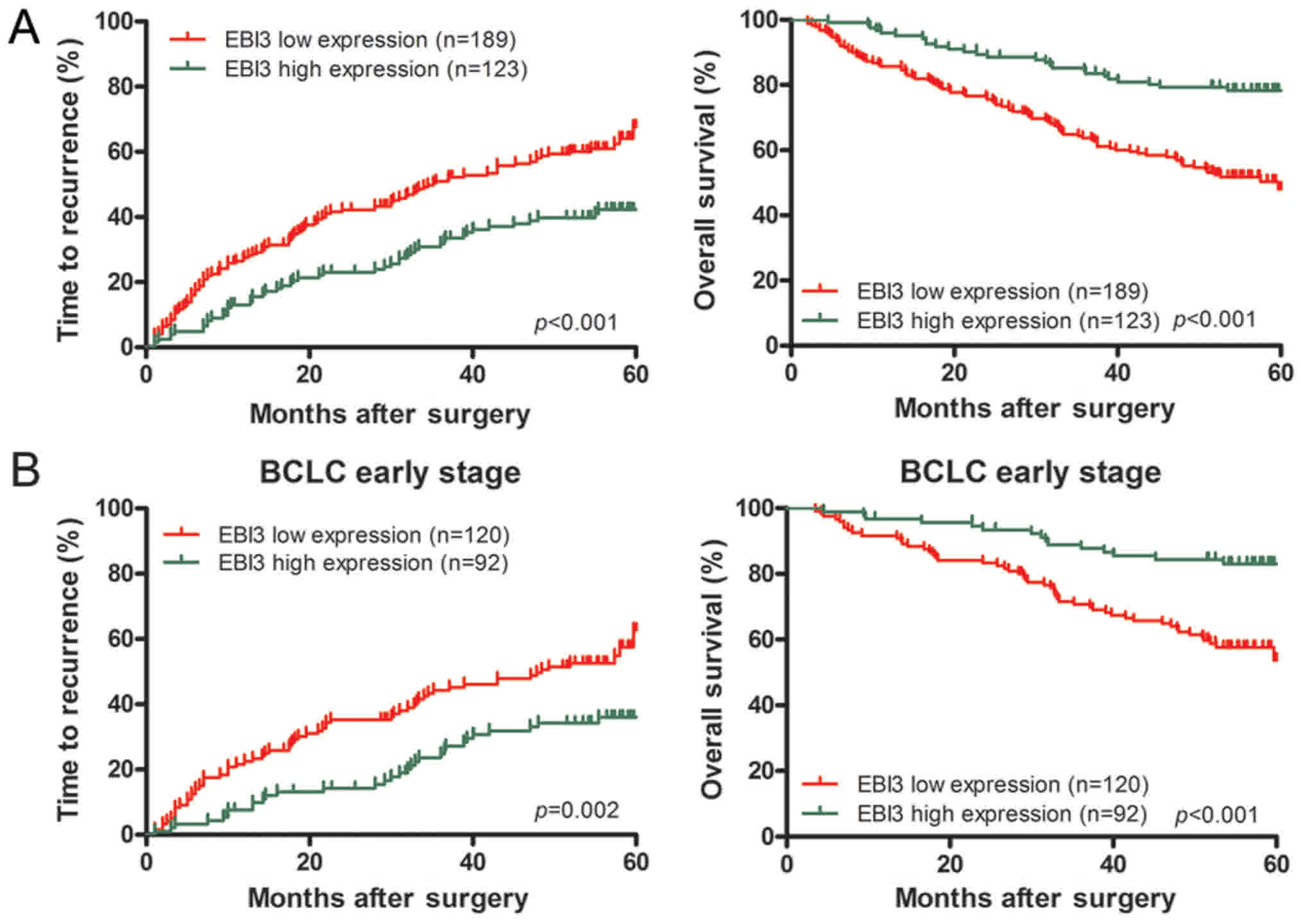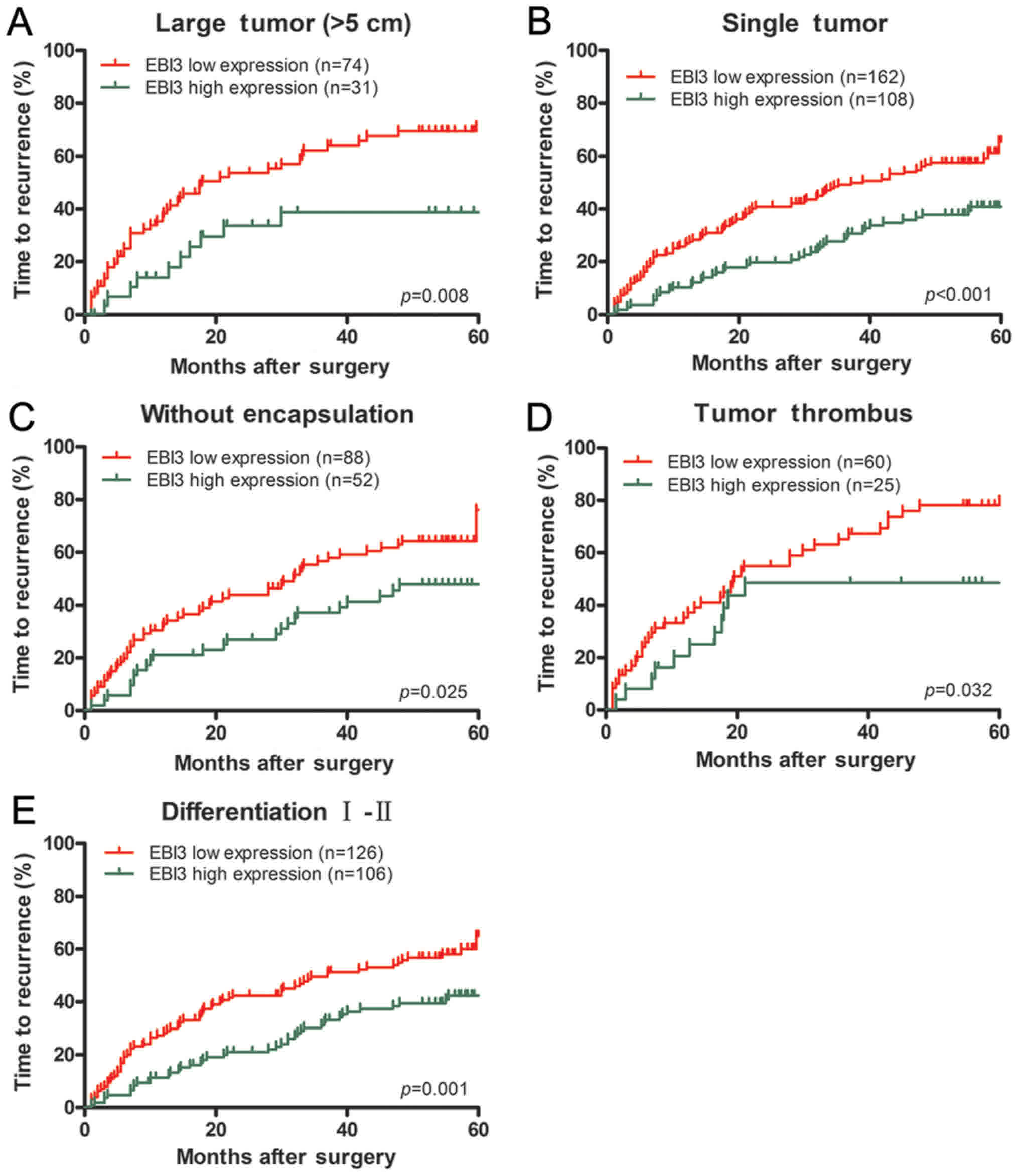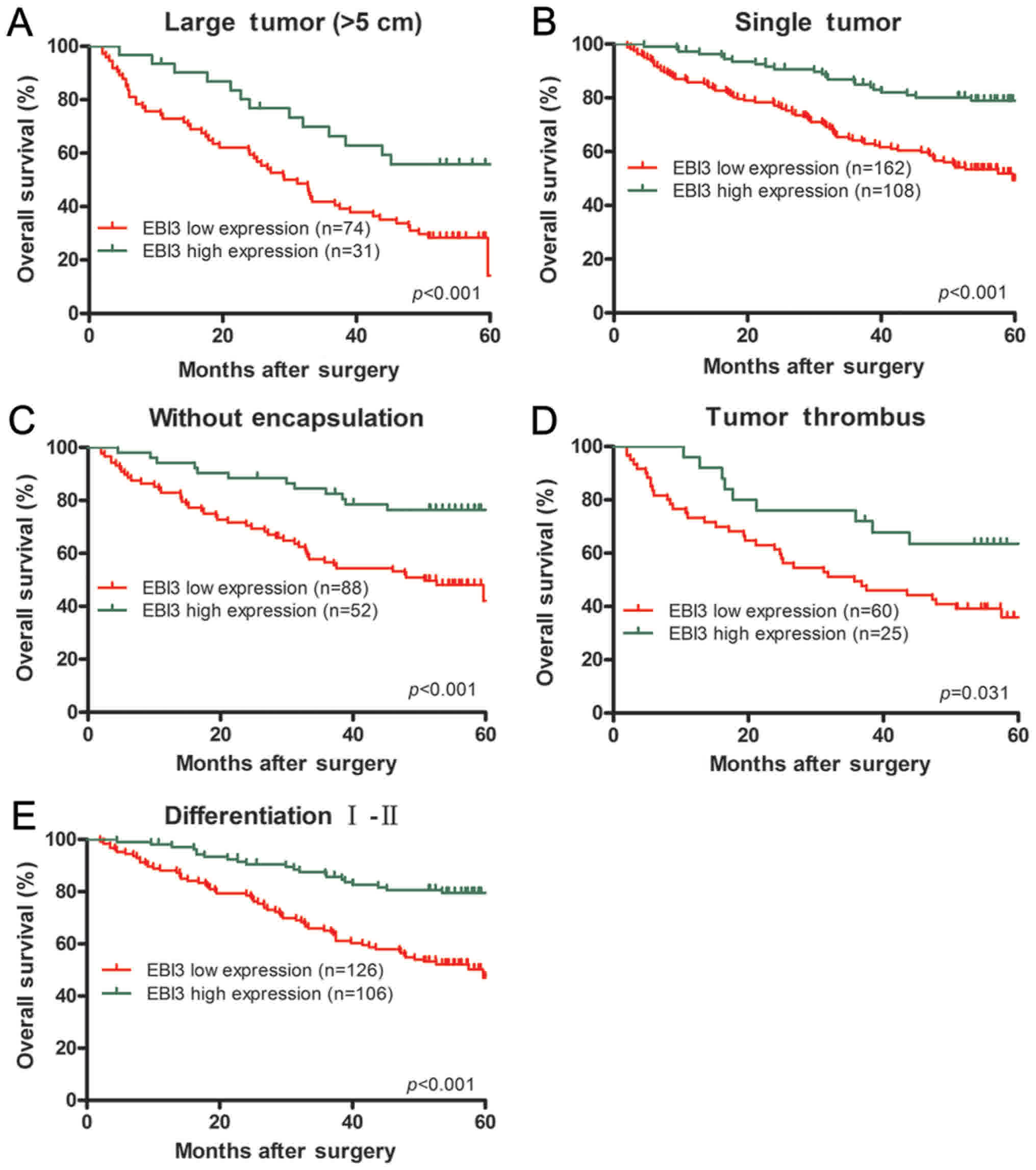|
1
|
Sun YF, Xu Y, Yang XR, Guo W, Zhang X, Qiu
SJ, Shi RY, Hu B, Zhou J and Fan J: Circulating stem cell-like
epithelial cell adhesion molecule-positive tumor cells indicate
poor prognosis of hepatocellular carcinoma after curative
resection. Hepatology. 57:1458–1468. 2013. View Article : Google Scholar : PubMed/NCBI
|
|
2
|
Chen R, Cui J, Xu C, Xue T, Guo K, Gao D,
Liu Y, Ye S and Ren Z: The significance of MMP-9 over MMP-2 in HCC
invasiveness and recurrence of hepatocellular carcinoma after
curative resection. Ann Surg Oncol. 19 Suppl 3:S375–S384. 2012.
View Article : Google Scholar : PubMed/NCBI
|
|
3
|
Hanahan D and Weinberg RA: Hallmarks of
cancer: The next generation. Cell. 144:646–674. 2011. View Article : Google Scholar : PubMed/NCBI
|
|
4
|
Horlad H, Ma C, Yano H, Pan C, Ohnishi K,
Fujiwara Y, Endo S, Kikukawa Y, Okuno Y, Matsuoka M, et al: An
IL-27/Stat3 axis induces expression of programmed cell death 1
ligands (PD-L1/2) on infiltrating macrophages in lymphoma. Cancer
Sci. 107:1696–1704. 2016. View Article : Google Scholar : PubMed/NCBI
|
|
5
|
Collison LW, Delgoffe GM, Guy CS, Vignali
KM, Chaturvedi V, Fairweather D, Satoskar AR, Garcia KC, Hunter CA,
Drake CG, et al: The composition and signaling of the IL-35
receptor are unconventional. Nat Immunol. 13:290–299. 2012.
View Article : Google Scholar : PubMed/NCBI
|
|
6
|
Vignali DA and Kuchroo VK: IL-12 family
cytokines: Immunological playmakers. Nat Immunol. 13:722–728. 2012.
View Article : Google Scholar : PubMed/NCBI
|
|
7
|
Ma Y, Chen L, Xie G, Zhou Y, Yue C, Yuan
X, Zheng Y, Wang W, Deng L and Shen L: Elevated level of
interleukin-35 in colorectal cancer induces conversion of T cells
into iTr35 by activating STAT1/STAT3. Oncotarget. 7:73003–73015.
2016. View Article : Google Scholar : PubMed/NCBI
|
|
8
|
Olson BM, Jankowska-Gan E, Becker JT,
Vignali DA, Burlingham WJ and McNeel DG: Human prostate tumor
antigen-specific CD8+ regulatory T cells are inhibited by CTLA-4 or
IL-35 blockade. J Immunol. 189:5590–5601. 2012. View Article : Google Scholar : PubMed/NCBI
|
|
9
|
Liang Y, Chen Q, Du W, Chen C, Li F, Yang
J, Peng J, Kang D, Lin B, Chai X, et al: Epstein-Barr virus-induced
gene 3 (EBI3) blocking leads to induce antitumor cytotoxic T
lymphocyte response and suppress tumor growth in colorectal cancer
by bidirectional reciprocal-regulation STAT3 signaling pathway.
Mediators Inflamm. 2016:32141052016. View Article : Google Scholar : PubMed/NCBI
|
|
10
|
Nishino R, Takano A, Oshita H, Ishikawa N,
Akiyama H, Ito H, Nakayama H, Miyagi Y, Tsuchiya E, Kohno N, et al:
Identification of Epstein-Barr virus-induced gene 3 as a novel
serum and tissue biomarker and a therapeutic target for lung
cancer. Clin Cancer Res. 17:6272–6286. 2011. View Article : Google Scholar : PubMed/NCBI
|
|
11
|
Fan YG, Zhai JM, Wang W, Feng B, Yao GL,
An YH and Zeng C: IL-35 over-expression is associated with genesis
of gastric cancer. Asian Pac J Cancer Prev. 16:2845–2849. 2015.
View Article : Google Scholar : PubMed/NCBI
|
|
12
|
Hou YM, Dong J, Liu MY and Yu S:
Expression of Epstein-Barr virus-induced gene 3 in cervical cancer:
Association with clinicopathological parameters and prognosis.
Oncol Lett. 11:330–334. 2016. View Article : Google Scholar : PubMed/NCBI
|
|
13
|
Zhang Y, Sun H, Wu H, Tan Q and Xiang K:
Interleukin 35 is an independent prognostic factor and a
therapeutic target for nasopharyngeal carcinoma. Contemp Oncol
(Pozn). 19:120–124. 2015.PubMed/NCBI
|
|
14
|
Jin P, Ren H, Sun W, Xin W, Zhang H and
Hao J: Circulating IL-35 in pancreatic ductal adenocarcinoma
patients. Hum Immunol. 75:29–33. 2014. View Article : Google Scholar : PubMed/NCBI
|
|
15
|
Wang Z, Liu JQ, Liu Z, Shen R, Zhang G, Xu
J, Basu S, Feng Y and Bai XF: Tumor-derived IL-35 promotes tumor
growth by enhancing myeloid cell accumulation and angiogenesis. J
Immunol. 190:2415–2423. 2013. View Article : Google Scholar : PubMed/NCBI
|
|
16
|
Zeng JC, Zhang Z, Li TY, Liang YF, Wang
HM, Bao JJ, Zhang JA, Wang WD, Xiang WY, Kong B, et al: Assessing
the role of IL-35 in colorectal cancer progression and prognosis.
Int J Clin Exp Pathol. 6:1806–1816. 2013.PubMed/NCBI
|
|
17
|
Fu YP, Yi Y, Cai XY, Sun J, Ni XC, He HW,
Wang JX, Lu ZF, Huang JL, Cao Y, et al: Overexpression of
interleukin-35 associates with hepatocellular carcinoma
aggressiveness and recurrence after curative resection. Br J
Cancer. 114:767–776. 2016. View Article : Google Scholar : PubMed/NCBI
|
|
18
|
Long J, Guo H, Cui S, Zhang H, Liu X, Li
D, Han Z, Xi L, Kou W, Xu J, et al: IL-35 expression in
hepatocellular carcinoma cells is associated with tumor
progression. Oncotarget. 7:45678–45686. 2016. View Article : Google Scholar : PubMed/NCBI
|
|
19
|
Wu H, Shi XL, Zhang HJ, Song QJ, Yang XB,
Hu WD, Mei GL, Chen X, Mao QS and Chen Z: Overexpression of
ST3Gal-I promotes migration and invasion of HCCLM3 in vitro and
poor prognosis in human hepatocellular carcinoma. Onco Targets
Ther. 9:2227–2236. 2016. View Article : Google Scholar : PubMed/NCBI
|
|
20
|
Huang J, Fan X, Wang X, Lu Y, Zhu H, Wang
W, Zhang S and Wang Z: High ROR2 expression in tumor cells and
stroma is correlated with poor prognosis in pancreatic ductal
adenocarcinoma. Sci Rep. 5:129912015. View Article : Google Scholar : PubMed/NCBI
|
|
21
|
Qi X, Jia J, Fan D and Han G: Brivanib for
hepatocellular carcinoma trials: Selection bias from barcelona
clinic liver cancer stage. J Clin Oncol. 32:9682014. View Article : Google Scholar : PubMed/NCBI
|
|
22
|
Lim KC, Wang VW, Siddiqui FJ, Shi L, Chan
ES, Oh HC, Tan SB and Chow PK: Cost-effectiveness analysis of liver
resection versus transplantation for early hepatocellular carcinoma
within the Milan criteria. Hepatology. 61:227–237. 2015. View Article : Google Scholar : PubMed/NCBI
|
|
23
|
Chen G, Liang Y, Guan X, Chen H, Liu Q,
Lin B, Chen C, Huang M, Chen J, Wu W, et al: Circulating low IL-23:
IL-35 cytokine ratio promotes progression associated with poor
prognosisin breast cancer. Am J Transl Res. 8:2255–2264.
2016.PubMed/NCBI
|


















